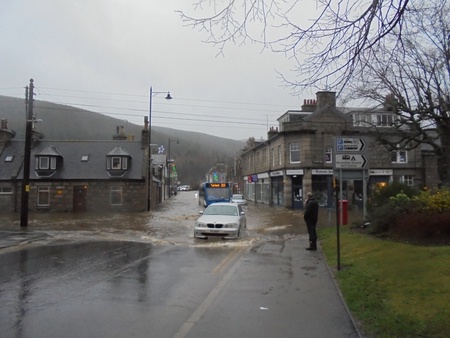A report co-authored by researchers from the University of Aberdeen and the James Hutton Institute has highlighted the profound and long-lasting impacts of flooding on individuals, businesses and communities in Scotland.
The report by Scotland’s Centre of Expertise for Waters (CREW) is the result of a three-year study in which researchers spoke to people living in communities that had been severely affected by flooding in North East Scotland during the winter of 2015-2016.
The team detailed the impact of flooding on individuals and communities in Ballater and Garioch, and found the impacts surpassed the financial and physical damage experienced in the immediate aftermath.
Some participants reported negative impacts months and even years after the flood. In particular, mental health impacts appeared to persist even until the present day.
One participant from Ballater said: “Ballater isn't back to normal, it's not going to be back to normal for a couple of years. In actual fact I would say the whole community is suffering from post-traumatic stress.”
Researchers and participants worked together to develop advice to others at risk of being flooded in the future.
The report provides recommendations designed to enhance measures for flood risk management and personal and community resilience. The new guidance includes advice on having a household emergency plan that clearly sets out what action should be taken in the event of serious flooding.
The report also highlights the importance of clear communication before, during and after episodes of flooding, recommending that flood alerts and warnings should use accessible language to help ensure that appropriate action is taken by members of the public. It also highlights the importance of using a variety of methods to communicate information, including print and broadcast media, social media and other online channels.
During episodes of serious flooding, when the emergency services will be operating at capacity, home and business owners should be prepared to put their own emergency plan into action and to help neighbours and vulnerable members of the community, the report recommends.
Dr Lorna Philip from the University of Aberdeen, who co-led the work with Dr Mags Currie from the James Hutton Institute, said: “This report draws upon the experiences of hundreds of people affected by the floods which struck communities in north-east Scotland over the winter of 2015-16, and demonstrates the profound impact this has had on individuals, households, businesses and communities.
“Key to our recommendations is guidance on how households can prepare for future flood events and suggestions as to how statutory agencies and other groups and organisations can help communities and individuals become more resilient.
“We also stress the importance of clear communication across multiple platforms to help people make informed choices on how best to respond to flood risk. I was delighted to present our findings at the recent Scotland Flood Risk Management Conference 2020, and my hope now is that our recommendations are useful for community resilience planning in the future.”
Professor Bob Ferrier, Director of CREW, commented: “Once again over the last few days, we have seen communities being devastated by flooding as Storm Ciara passed over the UK. Such flooding continues to have a significant impact on people’s personal well-being, livelihoods, and property.
“This study reveals the consequence of such events on people and communities and the potential legacy of such increasingly frequent damaging storms, both now and into the future.”
Dr Mags Currie, from the James Hutton Institute, said: “Our research has demonstrated that flooding affects people for years after the event and recommends ways in which flooded households and communities can be appropriately supported in the immediate aftermath as well as the longer-term.”
Dr Rachel Helliwell, CREW manager, commented: “Flooding isn’t just about the physical and economic impacts on a community. This study has demonstrated, the significant long-term social impact of flooding on communities. Effective communication is essential in maintaining and re-building community cohesion and resilience.”
Dr Pascal Lardet, Scottish Environment Protection Agency (SEPA) Flood Warning & Informing Unit Manager and member of the project steering group, added: “Every day the Scottish Environment Protection Agency helps Scotland prepare more powerfully for future increased flooding and the impacts of climate change. These impacts can be devastating, and this research offers unique insights into the experience of people and communities in Scotland following the major floods of winter 2015/16.
"SEPA has a key role to play to help people be better prepared and able to take action when flooding is expected. We are already learning and adapting our own services thanks to this research project, for example by improvements to our flood early warning and real-time water level information. We are keen to better design our services around customer needs, and this research output will help us do that.”
The Scottish Government's Cabinet Secretary for Environment, Climate Change and Land Reform, Roseanna Cunningham MSP, said: “I have seen for myself the immediate impact flooding has but this study helps us better understand how devastating flooding is for businesses, families and communities alike.
“This is why the Scottish Government has supported the Scottish Flood Forum since 2008. This year, we have made £190,000 available to the Forum to help communities prepare for and recover from flooding.
“I am grateful to the residents of Ballater and Garioch who gave their time to speak to the researchers about their personal experiences, and look forward to the findings from this study to help build on our resilience and minimise the impact of flooding across the country.”
The publication Long-term impacts of flooding following the winter 2015/16 flooding in North East Scotland: Summary Report is available on the CREW website.


